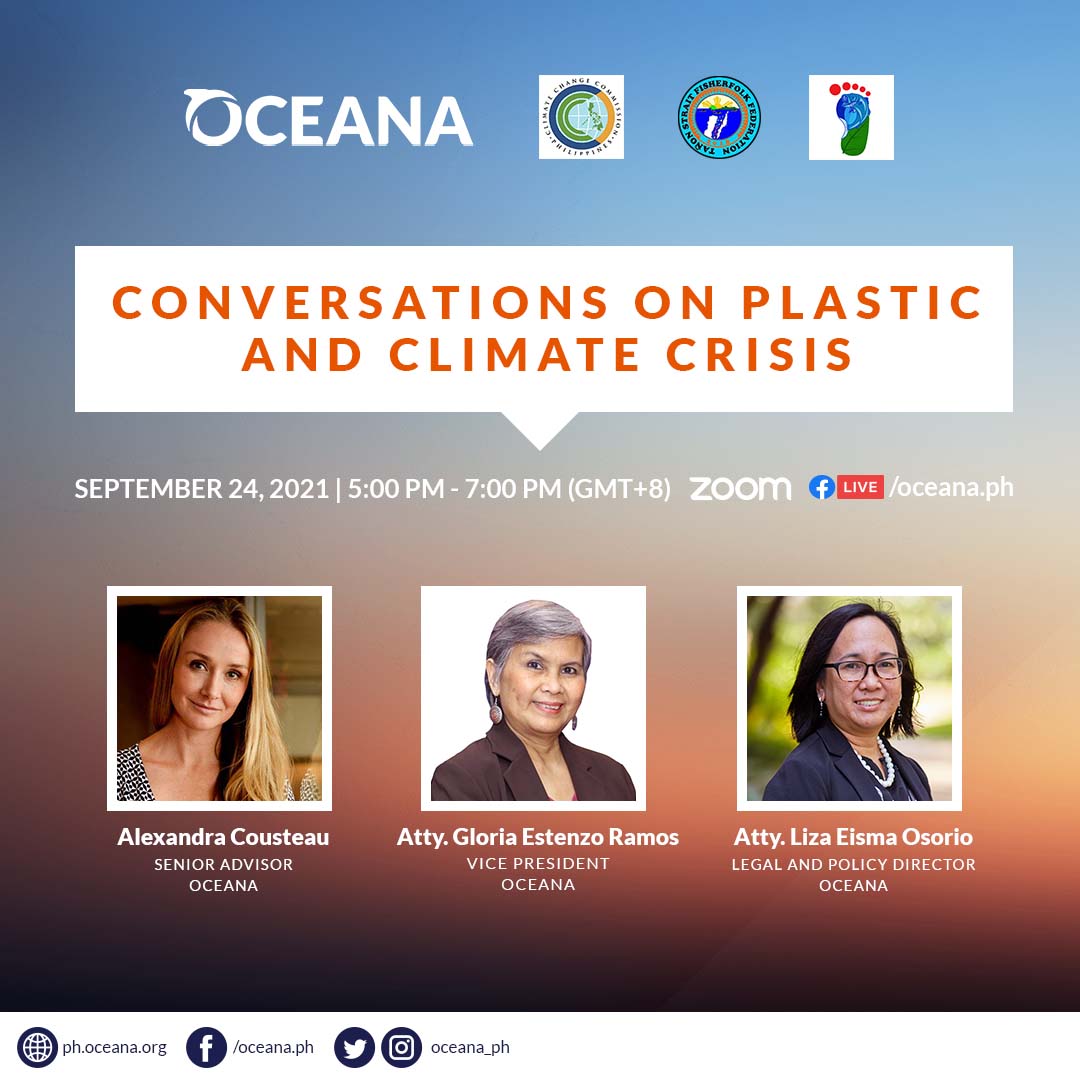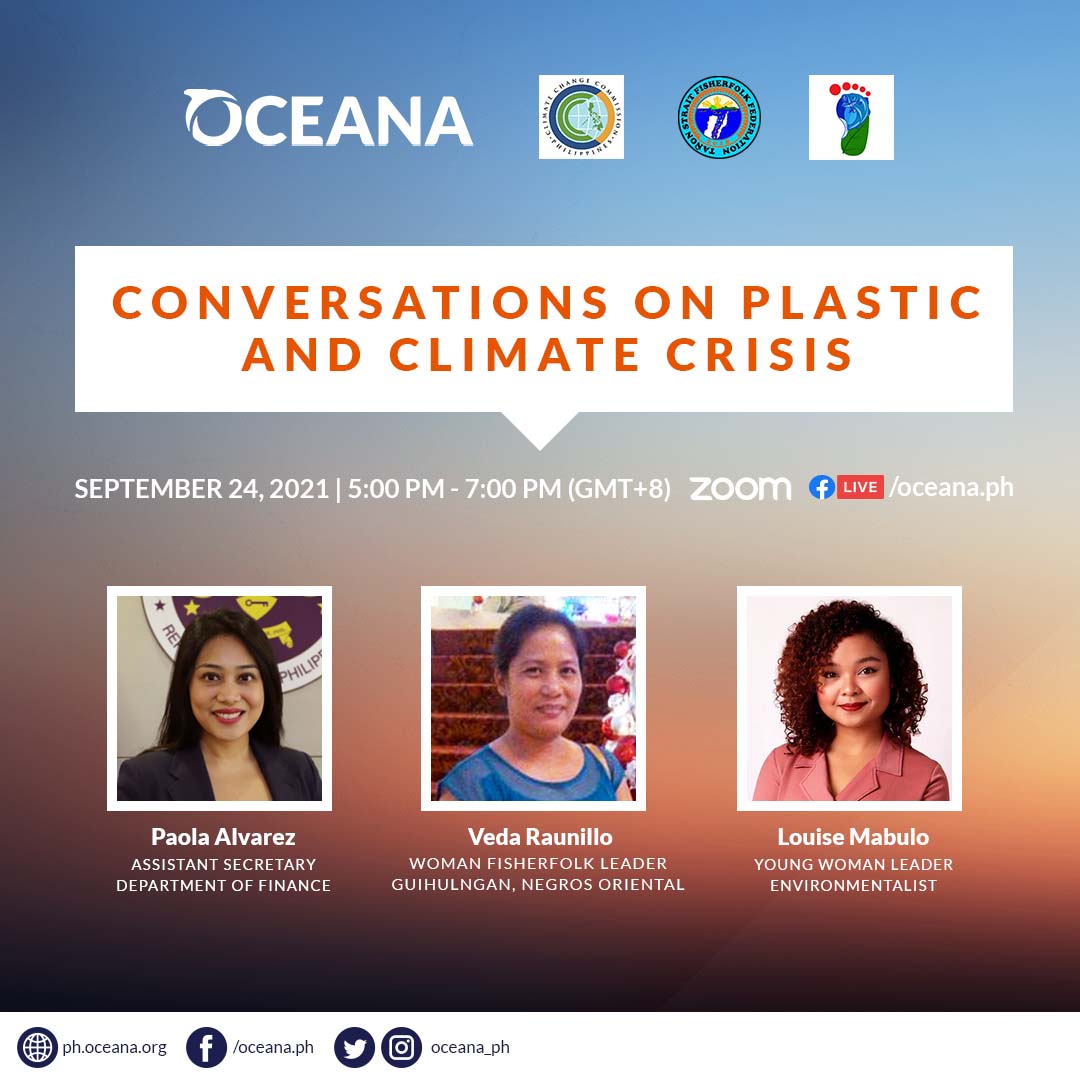Women leaders raise health hazards of plastics and climate crisis impact on families, future generations
Press Release Date: October 6, 2021


Plastics pose increasing health risks to our families and communities while the impact of climate crisis hit the most vulnerable among the poor coastal communities. As households and families fight for their life and survival from the COVID-19 pandemic, the hidden cost on human lives by a planet beset with plastics needs to be exposed and investigated.
These were at the center of the conversations held among women leaders recently by international advocacy group Oceana, which gathered resource persons from government and non-government organizations for a virtual roundtable discussion on the impact of plastics and climate crisis.
The granddaughter of renowned undersea explorer Jacques Cousteau, filmmaker and environmental activist Alexandra Cousteau, shared the role of motherhood in the way she viewed plastic pollution today.
“When I grew up by the beaches as a child, I never saw plastic. It was never there littering our beaches all over the world. It is heartbreaking to me personally, as an earthling living here, seeing the world turn into trash. As a mother, when I was pregnant with my children I avoided food that was in plastic containers and in plastic bottles. And I know in spite of that, they will always be exposed to that no matter what I do. There are studies showing fetuses encountering microplastics while they are developing in their mothers as fetuses,” said Cousteau, who is also a senior adviser at Oceana.
She added: “It’s pervasive now, it’s in the sky, it’s in raindrops, it’s everywhere. It makes this challenge of stopping the flow of plastic into our natural environments all the more urgent because quite literally it is having an impact on our future generations, our children. It’s doing irreparable damage to their future lives in ways we cannot understand fully.”
In its 2019 report Plastic & Health: The Hidden Costs of a Plastic Planet, the Center for International Environmental Law (CIEL) cited studies showing the health risks caused by plastic exposure to children, infants, and pregnant women in areas where there are expansive oil and gas production.
According to the report, 99% of plastic comes from fossil fuels, the extraction of which releases an array of toxic substances into the air and water, often in significant volumes. It further said that over 170 fracking chemicals that are used to produce the main feedstocks for plastic have known human health impacts, including cancer, neurological, reproductive, and developmental toxicity, impairment of the immune system, and more.
Nearly every piece of plastic begins as a fossil fuel and greenhouse gasses are emitted in every stage of its lifecycle from extraction and transport, refining and manufacture, waste management until it ends up in the environment, according to another report by CIEL on plastic and climate. And as production of plastic products and packaging persists, so do the greenhouse gas emissions that threaten our planet and climate at a global scale.
The Philippines has a long way to go in managing its plastic waste and preventing it from reaching our oceans and harming human health. To date, seven of its rivers have landed in the world’s top 10 ocean polluters list.
“On average, we have 4.8 to 7.8 million tons of plastic leaking into our oceans globally, and as an archipelago most of our rural folks and people below the poverty line depend on the fisheries for their livelihood and sustenance. If our water is unclean, our food is unclean, we cannot ensure that we will have young and healthy Filipinos in the future,” said Finance Assistant Secretary Paola Alvarez, who also emphasized the need for the government to create a healthy environment for its people, especially for the mothers and their young.
Echoing this call for the government to push for meaningful environmental changes are many women involved in advocacy work, according to Atty. Gloria Estenzo Ramos, Vice President of Oceana.
“Among our ocean heroes, we have women who continue to make a difference. A lot of women are effecting changes through the environmental movement, although not as publicized. In the Philippines, we have seen through the various campaigns and advocacies that we have worked on how women play a very important role not only in their families but also in their communities,” she said.
Ramos was pertaining to fisherfolk leader Veda Raunillo of Negros Oriental and marine conservation champion Jocelyn Moya-Herkdle of Negros Occidental, who received Oceana’s Ocean Heroes award for their contributions to ocean conservation efforts.
“We are surrounded by women, and it’s important that they are given access to education and venues for their voices to be heard,” Ramos added.
But so much more must be done to provide opportunities and venues for more women to take part in changing society, according to United Nations Young Champion of the Earth awardee Louise Mabulo.
“We see young people having a great impact. We see young women taking the lead, predominantly women taking the lead in climate solutions. But when it comes to discussions on the table about climate crisis when it comes to policy, we find that women and children are still highly unrepresented. And we need people to speak up about these experiences and issues, and put a face in these statistics – that it’s not just numbers being impacted but real people,” Mabulo told the all-women forum.
Likewise, Cousteau urged her fellow resource speakers and women to “push as hard as citizens of this planet from all our different communities to make ourselves heard and to make it clear, not only to government officials but also to corporate entities that we demand they create change.”
“We have been talking about this issue for decades, and we haven’t had significant change, we haven’t even scratched the surface to be able to prevent the worst impacts of climate change or plastic pollution. But I think there are some reasons to be hopeful, and young women and leaders are a perfect example of why I think there is a lot of reason to be hopeful in the course of the next decade where we can create an impact. We have never been able to hear the voices of young people like we do today. We have never heard the voices of women like we do today. We are in a completely different place than we were years ago in terms of our ability to understand and create change,” said Cousteau.
In response to the worsening plastic pollution in the Philippines, Oceana and other environmental advocates, local government, fisherfolk, and representatives from the youth served notices to sue on June 15, 2021 to the National Solid Waste Management Commission (NSWMC) and 13 of its members, for failing to implement the Philippines’ 20-year old Ecological Solid Waste Management Act (Republic Act 9003), which mandates the release of a list of non-environmentally acceptable products and packaging.
Oceana is an international advocacy organization dedicated to protecting the world’s oceans. Since 2014, Oceana has been working closely with national and local government agencies, civil society, fisherfolk and other stakeholders to restore abundance of Philippine fisheries and marine resources. (END)
For More Information:
Joyce Sierra, Communications Manager, Oceana
Mobile: 09178214430 E-mail: jsierra@oceana.org
Facebook: www.facebook.com/oceana.philippines Twitter: @oceana_ph Instagram: @oceana_ph
